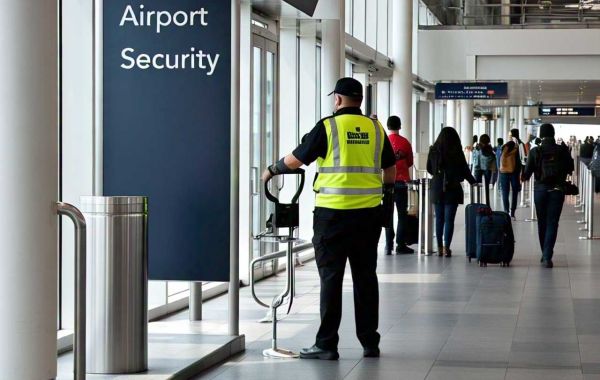The Growing Importance of Airport Security
Airports are complex, high-traffic zones that require an advanced level of security. With the rise in global air travel, ensuring safety at airports has become more critical than ever. Security threats, including terrorism, smuggling, and unauthorized access, require a constant watch. Security guards play a key role in managing these threats while maintaining a safe and welcoming environment for passengers. Their presence deters criminal activity and assures the public of their safety.
Understanding the Role of Security Guards at Airports
Security guards are the first line of defense in airport security. They are responsible for checking credentials, monitoring surveillance systems, and handling emergency situations. These professionals work closely with airport authorities, law enforcement, and airline staff to coordinate safety procedures. Their duties require high levels of training, quick decision-making skills, and vigilance. They also manage crowd control during peak hours and respond to incidents that could disrupt airport operations.
Access Control and Perimeter Monitoring
One of the primary tasks of airport security guards is controlling access to restricted areas. They ensure only authorized personnel and passengers enter certain zones by verifying ID badges and tickets. This control helps in preventing unauthorized entries that could pose serious threats. Security guards also patrol the airport perimeter, keeping an eye on fences, gates, and surrounding areas. This proactive measure helps in identifying suspicious activities before they escalate.
Passenger and Baggage Screening Assistance
While advanced screening machines handle most of the passenger and baggage checks, security guards assist in the smooth functioning of these operations. They monitor lines, direct passengers, and step in if any issues arise during the screening process. In case of a flagged bag or suspicious behavior, they are trained to react immediately, ensuring minimal disruption to other travelers. Their alertness prevents prohibited items from entering secure areas.
Handling Emergencies and Crisis Situations
Airports can face various emergency scenarios like medical situations, fire alarms, or security breaches. Trained guards respond quickly and appropriately to such incidents. Whether it’s helping evacuate the building or containing a disturbance, their calm and decisive action can save lives. Security guards also play a critical role during bomb threats or natural disasters by guiding people to safety and coordinating with emergency services.
Crowd Management and Queue Control
Airports are often congested, especially during holidays and peak travel seasons. Security guards help manage these crowds to prevent chaos. They guide passengers, manage queues, and de-escalate any conflicts that may arise in long lines or crowded terminals. Their presence helps maintain order and ensures that airport operations continue without unnecessary delays or disturbances.
Surveillance and Monitoring Systems
Modern airports are equipped with extensive CCTV surveillance systems. Security guards monitor these cameras in real time, ensuring all areas remain secure. They observe for any suspicious behavior, unattended luggage, or individuals loitering in sensitive areas. With experience, they can detect threats early and alert the appropriate authorities before an incident occurs. Surveillance also helps in reviewing incidents post-event for investigation purposes.
Cooperation with Law Enforcement Agencies
Security guards often serve as the eyes and ears of law enforcement agencies within airport premises. When an incident requires police involvement, guards are the first to gather information and secure the scene. Their coordination with agencies ensures that legal procedures are followed correctly and efficiently. This partnership improves the overall safety structure and response time during emergencies.
Specialized Training and Certifications
Airport security is not a generic job. Guards working in such environments undergo specific training to handle aviation-related threats. They are trained in behavior detection, conflict resolution, emergency response, and legal compliance. Regular workshops and updates help them stay prepared for evolving threats. These certifications make them an invaluable asset in any airport's security infrastructure.
Maintaining Public Confidence in Travel Safety
The presence of uniformed guards provides peace of mind to travelers. Knowing that there are professionals actively monitoring their safety encourages more people to travel without fear. It also reduces stress levels among passengers, especially in the current global climate where health and safety have become more important than ever. This public confidence contributes to a better travel experience.
Security for VIPs and Sensitive Areas
Airports often host VIPs, celebrities, and government officials. These high-profile individuals require additional layers of security. Guards are assigned to escort and protect them while ensuring their movement does not affect general operations. Sensitive areas such as control towers, fuel zones, and aircraft parking areas also need constant monitoring. Guards assigned to these locations are specially trained for heightened responsibility.
Role in Preventing Human Trafficking and Smuggling
Security guards play a silent but powerful role in identifying and preventing illegal activities such as human trafficking and smuggling. By observing passenger behavior and conducting random checks, they help law enforcement detect red flags. Guards are often trained to identify signs of distress or coercion, which are common in trafficking victims. Their vigilance directly contributes to global efforts to combat such crimes.
Static Security and Consistent Monitoring
Static security guards are essential in monitoring specific checkpoints or entry points within airports. Their presence ensures consistent oversight and reduces the risk of internal threats. Hiring reliable services that specialize in such roles significantly boosts airport safety. One such dependable provider is known for offering dedicated checkpoint personnel that meet high security standards.
Impact of Technology on Security Operations
Technology has enhanced the efficiency of airport security guards. With biometric access systems, AI-based surveillance, and real-time communication devices, guards are more equipped than ever to maintain safety. However, human judgment and physical presence remain irreplaceable. Technology supports their work but does not replace the need for trained personnel on the ground.
Cost-Effectiveness of Professional Guard Services
While installing machines and automation helps, professional guards offer a cost-effective solution for overall safety. Their flexibility to handle diverse situations—from directing lost passengers to managing security threats—adds immense value. Investing in experienced professionals for airport safety ensures a comprehensive and human-centric security model that technology alone cannot provide.
Final Thoughts: A Pillar of Modern Airport Safety
Security guards are not just employees; they are an integral part of the airport's ecosystem. Their responsibilities go far beyond monitoring and reporting. They actively contribute to maintaining a secure, orderly, and traveler-friendly atmosphere. As threats evolve, so does the role of security personnel, making them vital to the future of global air travel.
Frequently Asked Questions (FAQs)
1. What are the key duties of airport security guards?
They manage access control, monitor CCTV, assist in screening, handle emergencies, and coordinate with law enforcement.
2. How are airport guards trained?
They undergo specialized training in emergency response, behavior detection, and aviation security protocols.
3. Are security guards different from law enforcement officers at airports?
Yes, guards provide preventive and support services, while law enforcement handles legal enforcement and criminal cases.
4. Do airport guards monitor CCTV systems?
Absolutely. Guards monitor surveillance feeds to detect suspicious behavior or unattended baggage.
5. Why are static security guards important at airports?
They provide consistent protection at fixed points like entry gates, enhancing long-term safety.
6. Can security guards help in case of a medical emergency?
Yes, they are often trained in basic first aid and assist until medical teams arrive.








